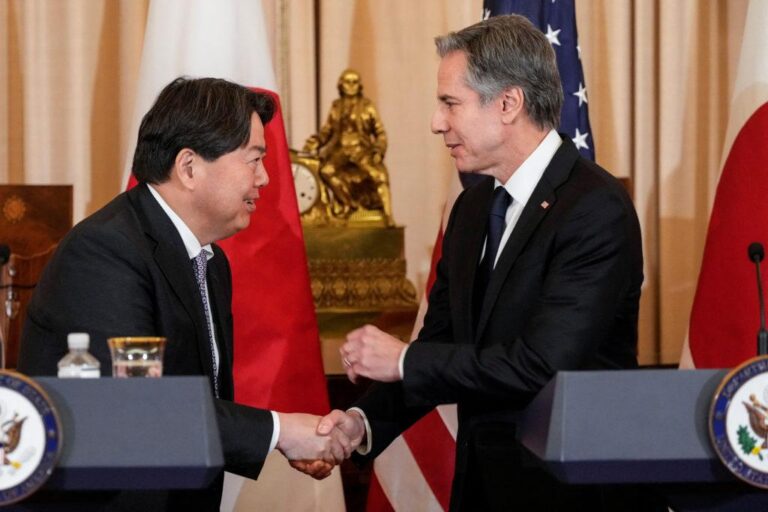The United States has officially entered into collaboration agreements with Japan and South Korea, aiming to strengthen partnerships in the fields of artificial intelligence, semiconductor technology, and biotechnology. Announced on Tuesday, these agreements mark a significant step in bolstering innovation and supply chain resilience amid escalating global competition. The strategic partnerships underscore the commitment of the three nations to advance critical technologies through shared research, development, and investment efforts, as geopolitical tensions and technological rivalry continue to shape the international landscape.
US Strengthens Strategic Ties with Japan and South Korea Through AI and Biotech Collaboration
In a significant move to bolster technological leadership and economic security, the US has inked pivotal collaboration agreements with Japan and South Korea, focusing on artificial intelligence, semiconductor manufacturing, and biotechnology. These partnerships aim to leverage the unique strengths of each country to fuel innovation, enhance supply chain resilience, and counterbalance global competition in critical technology sectors. Key areas of cooperation include joint R&D projects, talent exchange programs, and co-investment in cutting-edge startups specializing in AI-driven applications and next-generation chip fabrication.
Strategic priorities outlined in the agreements emphasize advanced semiconductor materials, AI ethics and safety frameworks, and biotech breakthroughs in personalized medicine. Officials anticipate that these efforts will catalyze faster commercialization cycles and elevate trilateral diplomatic relations. The collaboration framework also features:
- Shared data infrastructure supporting cross-border AI research
- Standardization initiatives for AI chip interoperability
- Joint funding schemes targeting early-stage biotech ventures
- Annual technology summits rotating among the three nations
| Focus Area | US Strength | Japan & South Korea Strength |
|---|---|---|
| AI Development | Research & algorithms | Hardware & application deployment |
| Semiconductors | Chip design & IP | Fabrication & supply chain |
| Biotechnology | Genomics & data analysis | Pharma innovation & clinical trials |
Key Technological Focuses in the New US-Asia Partnerships: Semiconductors, Artificial Intelligence, and Biotechnology
The renewed US partnerships with Japan and South Korea signal a strategic pivot towards reinforcing leadership in critical technology arenas. At the forefront of this collaboration lies the semiconductor industry, a sector pivotal for global supply chain stability and technological sovereignty. Both Asian allies bring advanced manufacturing capabilities and innovation prowess, complementing the US’s investment drive in cutting-edge chip technology. This trilateral effort aims to accelerate research and production capacity to counteract global chip shortages and geopolitical risks.
In addition to semiconductors, artificial intelligence (AI) and biotechnology are set to be key pillars of the alliance. Enhanced AI cooperation will focus on ethical frameworks, shared data environments, and joint R&D ventures, advancing capabilities across robotics, automation, and predictive analytics. Meanwhile, biotechnology initiatives will prioritize health security, bio-manufacturing, and precision medicine, leveraging the unique strengths of each partner’s scientific communities. This trilateral framework is expected to establish joint standards and streamline innovation pipelines for faster deployment of emerging technologies.
- Semiconductors: Manufacturing scale-up, supply chain resilience, and next-gen chip design
- Artificial Intelligence: Ethical AI development, shared R&D, and data collaboration
- Biotechnology: Health security, bio-manufacturing, and genetic research
| Technology Focus | Primary Goal | Lead Contributor |
|---|---|---|
| Semiconductors | Supply chain stability & innovation | South Korea |
| Artificial Intelligence | Ethical frameworks & AI R&D | United States |
| Biotechnology | Health security & precision medicine | Japan |
Policy Implications and Industry Recommendations for Maximizing Benefits from the US-Japan-South Korea Agreements
To capitalize on the trilateral agreements, policymakers must prioritize streamlined regulatory frameworks that foster innovation while maintaining competitive safeguards. Emphasizing joint R&D funding, harmonized intellectual property rights, and data-sharing standards will be critical for accelerating breakthroughs in AI, semiconductor manufacturing, and biotechnology. Governments should also consider incentives for cross-border talent exchange programs and public-private partnerships, mitigating the risk of technological silos and amplifying knowledge transfer across the three nations.
Industry leaders are encouraged to adopt a collaborative mindset, focusing on building interoperable systems and scalable supply chains that leverage each country’s unique strengths. Key recommendations include:
- Investing in secure, cross-border data infrastructure to enable real-time AI model training and biotech research.
- Developing adaptable manufacturing processes that can swiftly respond to supply chain disruptions.
- Prioritizing ethical standards that align with shared values across the US, Japan, and South Korea.
| Sector | Policy Focus | Industry Action |
|---|---|---|
| AI | Data privacy & shared R&D investment | Joint algorithm development hubs |
| Chips | Supply chain resilience & semiconductor standardization | Cross-border manufacturing consortia |
| Biotech | Harmonized clinical trial protocols | Collaborative biomedical innovation labs |
The Conclusion
As the United States formalizes its collaboration agreements with Japan and South Korea, the partnership marks a significant stride in advancing innovation across AI, semiconductor manufacturing, and biotechnology. These alliances underscore a shared commitment to strengthening technological leadership and addressing global challenges through cooperative development. Moving forward, stakeholders will be watching closely to see how these trilateral efforts shape the future landscape of high-tech industries and economic security in the Indo-Pacific region.




